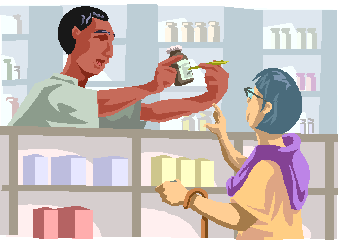английский за проф направлением. Укладач Триполець В.І. Рецензенти
 Скачать 4.04 Mb. Скачать 4.04 Mb.
|
|
2. Complete the dialogues disagreeing with your partner. Practise the dialogues. Example: A) l thought you said the drugs were for internal use. B) No, quite the opposite, the drugs are for external use only.
B. No, I'm afraid not, rather...
B. No, I'm afraid you're mistaken, a great amount of medicines are... 5. A. It's him who graduated from the school of Pharmacy? B. No, apparently he's only... 3. Ask your partner which things from the matrix most typically go together. Underline any words that might be useful for describing a chemist's.
4. Fill in the missing items in this word class table using a dictionary if necessary. Where there is a dash (—) you do not need to write anything.
5. What does a pharmacist use the following things for? Example: Prescription For delivering medicines
6. Learn some job titles connected with a chemist's shop. Which of the job titles would be best to describe the following? Try to work from memory. Compare your answers with your partners. a manager a dispensing pharmacist a chemist inspector a chemist analyst a pharmacist
VIII. Speaking. 1. Read and translate the quotation. Divide into-two groups: group 1 students agree with the idea of N. Bonoparte; group 2 students have quite an opposite idea. Medicine is a collection of uncertain prescriptions, the results of which, taken collectively, are more fatal than usual to mankind. Water, air and cleanliness are the chief articles in my pharmacopoeia. (N. Bonaparte) 2. Read the proverb, translate it. Comment and discuss it in groups. Remedy may be worse than the disease. IX. Supplement. Read the following text. Put questions and retell it. COMMUNITY PHARMACY A pharmacy (commonly the chemist's in Australia, New Zealand and the UK; or drugstore in North America; retail pharmacy in industry terminology; or Apothecary, historically) is the place where most pharmacists practice their professional habits. It is the community pharmacy where the dichotomy of the profession exists — health professionals who are also retailers. Community pharmacies usually consist of a retail storefront with a dispensary where medications are stored and dispensed. The dispensary is subject to pharmacy legislation; with requirements for storage conditions, compulsory texts, equipment, etc., specified in legislation. Where it was once the case that pharmacists stayed within the dispensary compounding/dispensing medications; there has been an increasing trend towards the use of trained pharmacy technicians while the pharmacist spends more time communicating with patients. All pharmacies are required to have a pharmacist on-duty at all times when open. In many jurisdictions, it is also a requirement that the owner of a pharmacy must be a registered pharmacist (R. Ph.).  This latter requirement has been revoked in many jurisdictions, such that many retailers (including supermarkets and mass merchandisers) now include a pharmacy as a department of their store. Likewise, many pharmacies are now rather grocery store-like in their design. In addition to medicines and prescriptions, a lot of establishments sell a diverse arrangement of additional household items such as cosmetics, shampoo, office supplies, confectionary, and snack foods. 22. Duties of the pharmacist in a pharmacy. Обов’язки фармацевта в аптеці. I. Vocabulary. 1. Read and learn the topical vocabulary. duties – обов'язки; responsibility – відповідальність; to perform – виконувати; prescription – рецепт; toregard – розглядати; assure – забезпечувати; take care of –піклуватися; tobe misused – неправильно вживати; side effect –побічна дія; may cause –може спричинити; aseptic techniques –асептичні методики; sterile products –стерильна продукція; precaution – обережність, застережний захід; maintain – підтримувати (зберігати); inventory – інвентар. 2. Find words by their definitions.
3. Make up a story using the words from Exercise 1. II. Reading. Read the text and discuss what you have just read. PHARMACIST'S DUTIES Not many people know everyday functions and commitments of a pharmacist. Going to your local pharmacy is one of the most routine trips, but have you ever wondered what people dispense your drugs?  Pharmacists are experts in drug discovery, development, preparation and usage. They are both professional scientists and qualified health care practitioners. Pharmacists work in. hospitals, in the community and in the pharmaceutical industry. They promote the safe and effective use of medicines and ensure quality patient care. Often, pharmacists are the first point of information on medicines for the public and other health care professionals, and must be effective communicators. Pharmacists, or pharmaceutical chemists, are specialized individuals in the field of chemistry. Their responsibilities are to take care of patients' health and — in many cases — their lives. The knowledge of medications is absolutely vital for a pharmacist. Pharmacists not only dispense medications, they also teach general public about drugs and advise them on safe use. This is probably the single most important responsibility of pharmacists. If they cannot educate healthcare staff and general public about medications, there is a serious risk that drugs will be misused. A pharmacist explains to the patient when to take the medications and how they must be taken. Pharmacists also have to keep track of the newest drugs on the market and have the ability to answer questions regarding them as well. Pharmacists never stop learning about medications and pay attention to detail in such an important sphere. Also pharmacists are responsible for doctor's prescriptions and dispensing the medication ordered. Pharmacists check that the right amount of drugs is dispensed, and that the patient receives correct instructions. Pharmacists also have to dispense medications correctly and accurately. They make sure that the right drug is dispensed, and that it is given to the right patient in the right dosage. They are capable of compounding and mixing drugs for a wide range of applications as prescribed by physicians. Nowadays pharmacy as a profession continues to grow and expand as well as pharmacist's duties. |
